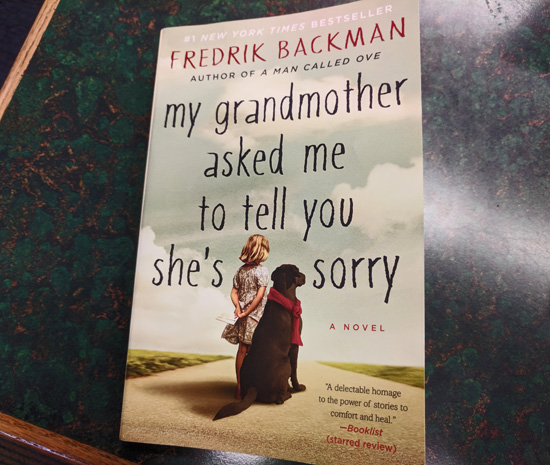Some kids are different. Some live in their own world. Some live in a world created by their grandmother.
In Frederik Backman’s “My grandmother asked me to tell you she’s sorry,” almost-8-year-old Elsa is all of those. Her nightly routine involves being carried off to a magical place between sleep and awake where all kinds of fantastical things happen and forces of good and evil battle for supremacy.
The past tense of the title suggests the worst, but plenty of pages go by before mention of an illness reminds you of that. Page 41 brought me back to reality after I had forgotten what this book was probably about.
“Tomorrow I am sending you out on a treasure hunt, and it’s going to be a fairy tale of marvels and a grand adventure,” Elsa’s grandma tells her. “And you have to promise not to hate me for it.”
The grandma character is wacky and fun, but to be honest, up until this point the book had not yet grabbed me. There is, necessarily, a lot of world-building that goes on, but when promised an adventure I really want to get to the adventure. So page 41 was both a reminder of what this story is really about, but also a welcome launch into the part I was eager to enjoy.
From there, the book was fantastic, using slow revelations of character back stories and grandma’s fantasy world. It doesn’t move at jet speeds like escapades in “Dash & Lilly’s Book of Dares” but it certainly gets going.
Elsa’s dad is decidedly not like her grandmother. He seems to lack any imagination or interest in doing anything outside of his careful habits. That mismatch prompts Elsa to sometimes try to get him to swerve, like calling him “you old hyena!” during after-school pickup.
“Because you can still feel scared while you’re yelling, ‘Well, hi there, you old hyena!’ to someone, but it’s almost insane how much more difficult it is.”
I encourage you to try that next time you need to convince yourself life is okay. I flagged about five things during the course of reading this book, and while I remember the dad being a somewhat minor character relative to some others, somehow he figures in two of them. Like when Elsa lies and later feels like she wants to come clean.
“But she doesn’t want to disappoint him, so she stays quiet. Because you hardly ever disappoint anybody if you just stay quiet.”
True for so many things. What I really enjoyed about this story is that from the very first page Elsa is clearly a different child from her peers and from the expectations of many of those around her, and except for dealing with some bullies at school, she’s completely unapologetic about that.
This is only a very, very, very minor spoiler, so if you plan to read this book go ahead and look away at this moment right now. Do it! Or just read on. Whatever floats your boat.
Like most people who are a little different, Elsa grows to find out in the short time we see her that by being herself she can eventually come across others who appreciate that and see that in themselves.
“But after that, one by one other different children start tagging along with Alex and Elsa in the playground and corridors. Until there are so many of them that no one dares to chase them anymore. Until they’re an army in themselves. Because if a sufficient number of people are different, no one has to be normal.”
